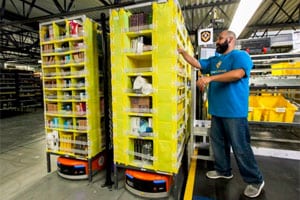 While Amazon may be known for its superior user experience, the services it offers sellers are just as compelling. For third-party sellers looking to optimize their Amazon strategy, Fulfillment by Amazon (FBA) lets them utilize the ecommerce giant’s expansive and efficient fulfillment infrastructure to warehouse units, pack and ship orders and provide customer service.
While Amazon may be known for its superior user experience, the services it offers sellers are just as compelling. For third-party sellers looking to optimize their Amazon strategy, Fulfillment by Amazon (FBA) lets them utilize the ecommerce giant’s expansive and efficient fulfillment infrastructure to warehouse units, pack and ship orders and provide customer service.
FBA’s user base has grown 65% since its inception. For the right merchants selling the right products, it offers a strong value proposition and can drastically save sellers both time and money. But to leverage it successfully, sellers have to consider many different factors to determine whether FBA is right for them. Whether or not to use FBA, and for which specific products, depends on the seller.
Below are some questions sellers should ask when considering FBA:
Do you have the manpower for fulfillment? FBA is a great resource for swamped sellers that don’t have sufficient manpower or other resources to meet their fulfillment needs. With FBA, Amazon will pick, pack and ship the products as well as manage customer relations.
How do your fulfillment services rank among other sellers? FBA has a huge influence on “buy box” ownership. For sellers, winning the coveted “buy box” ensures close to 100% more exposure and sales. In order to win the “buy box,” one thing Amazon considers is the overall customer experience. FBA is an Amazon service, and Amazon gives itself a perfect score for customer experience. Therefore, an FBA seller is far more likely to win the “buy box” than a non-FBA seller, who would have to have perfect or near-perfect scores in all areas as well as a competitive price for a fighting chance.
What are you selling? Some of FBA’s fees are associated with a product’s size and weight, so using it for large, low-priced items might be disadvantageous. But if items tend to be relatively small, lightweight, and higher priced, it makes the FBA fees more manageable. For example, a $10 item that is large and heavy will account for a large percentage of your fees, whereas a small and light item that sells at $30 will represent a smaller percentage. Thus, high ASP (average sale price) is a big consideration for FBA inventory selection. An example of a small, light, and high ASP product category is jewelry.
How much are you selling? For high-volume sellers struggling to find enough storage space, Amazon’s impressive storage capacities alone may justify using FBA. Modest sellers looking to sell more may consider how FBA’s management of all aspects of fulfillment frees up their time to focus on expanding their business.
Do you have time to label? When using FBA, Amazon fulfillment centers ask that sellers identify their products using unique product identifiers or labels if they wish to keep their products separate and distinct from other sellers. Many sellers opt not to do this, as it is a time-consuming process. Instead, merchants will send their products to Amazon as stickerless, commingled inventory to be pooled with identical products sent by other sellers. Therefore, fake or inferior products from other sellers can be sent out in their name.
Some other points to consider
A general advantage is that only FBA sellers are eligible for Amazon Prime, whose members spend more and shop more often on Amazon. Most importantly, they tend to shop for Prime-eligible products first, and will filter search results to show only Prime offers, effectively eliminating all non-FBA offers.
Since FBA is directly affiliated with Amazon.com, many believe it inspires more trust in Amazon shoppers, making them more likely to choose your brand over a non-FBA seller. Customers trust that Amazon will meet their expectations and that if anything goes wrong, Amazon will take care of it.
Finally…
A common misconception is that sellers should either be 100% FBM or 100% FBA, yet most professional Amazon sellers are an FBA/FBA hybrid. Each seller has to have a deep comprehension of their business and truly understand their inventory and sales patterns. Used correctly, FBA can be a highly effective strategic tool for sellers.
Shmuli Goldberg is the Director of Marketing at Feedvisor